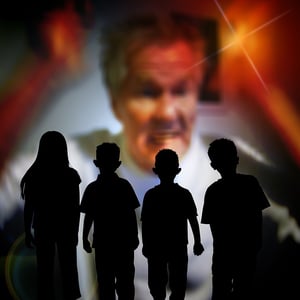A blog post by Melissa Ruisz Nazario, based on an interview with Dina Zaki, L.M.F.T., by Bonnie Bright, Ph.D.
Listen to the full audio interview with Dina Zaki here. (approx. 31 minutes)
_edited.jpg?width=312&name=800px-Narcissus-Caravaggio_(1594-96)_edited.jpg)
The Greek myth of Narcissus, one version of it at least, describes a young, proud hunter known for his good looks. He disdains others, including the mountain nymph Echo, who falls in love with him. Because of his behavior, Nemesis, a goddess of revenge, lures Narcissus to a pool, where Narcissus falls in love with the water’s reflection, not comprehending it is his own image. In one version, he stares at his own reflection until he dies. [1]
From this tale we have the terms “narcissism” and “narcissist,” and even the condition of “narcissistic personality disorder,” in which “people have an inflated sense of their own importance, a deep need for excessive attention and admiration, troubled relationships, and a lack of empathy for others. But behind this mask of extreme confidence lies a fragile self-esteem that’s vulnerable to slightest criticism.” [2]
Indeed, these terms have become so popular within our lexicon and culture that there are literally hundreds of questions on Quora, a user-generated Q&A app, asking how to identify a narcissist, whether a narcissist will ever change, and how to successfully leave a relationship with a narcissist. [3] Many accuse celebrities and even the current U.S. president of having NPD, even though mental health professionals are prohibited from diagnosing someone they have not personally treated, based on the Goldwater rule set forth by the APA in 1973. [4]
Lesser known, however, is the concept of the “narcissistic family,” a topic of research that practicing marriage and family therapist and fourth-year clinical psychology student Dina Zaki, L.M.F.T., has chosen for her dissertation research in the Clinical Psy.D. Program at Pacifica Graduate Institute. In a recent interview with Bonnie Bright, Ph.D., Dina describes her dissertation, which is titled “The Transgenerational Impact of Narcissistic Parenting,” as “examining the lived experiences of women who have been raised by narcissistic mothers and exploring their views of how that narcissistic parenting impacted them as a person and then also impacted their parenting of their own children.”
 So, what is a narcissistic family? In 1997, family therapists Stephanie Donaldson-Pressman, M.S.W., and Robert M. Pressman, Ph.D., A.B.P.P., co-authored The Narcissistic Family: Diagnosis and Treatment, a model for therapists and mental health practitioners to treat adults who came from family systems that were emotionally abusive or neglectful because the needs of the parents came before the needs of the children, due to reasons such as job stress, physical or mental disability, lack of parenting skills, and so on [5]. While a family who puts the children’s needs first tends to raise them to become independent, responsible adults who then model this healthy parenting style when they have children, the parents in narcissistic families withhold attention and affection until their own needs are met, and raise children who are reactive and reflective, that is, who “learn to wait to see what their parents expect and then react, negatively or positively, to those expectations.” [6]
So, what is a narcissistic family? In 1997, family therapists Stephanie Donaldson-Pressman, M.S.W., and Robert M. Pressman, Ph.D., A.B.P.P., co-authored The Narcissistic Family: Diagnosis and Treatment, a model for therapists and mental health practitioners to treat adults who came from family systems that were emotionally abusive or neglectful because the needs of the parents came before the needs of the children, due to reasons such as job stress, physical or mental disability, lack of parenting skills, and so on [5]. While a family who puts the children’s needs first tends to raise them to become independent, responsible adults who then model this healthy parenting style when they have children, the parents in narcissistic families withhold attention and affection until their own needs are met, and raise children who are reactive and reflective, that is, who “learn to wait to see what their parents expect and then react, negatively or positively, to those expectations.” [6]
In the Psychology Today article “The Narcissistic Family Tree,” Karyl McBride, Ph.D., lists the common dynamics of narcissistic families described in The Narcissistic Family, including:
- Family secrets, especially that the children’s needs aren’t being met
- Image to the outside world that there are no problems
- Negative spoken and unspoken messages that the children are not good enough
- Lack of parental hierarchy
- Lack of effective or direct communication or confrontation, passive-aggressive behavior
- Unclear boundaries and no right to children’s privacy
- One parent narcissistic, the other orbiting or enabling to keep the marriage intact
- Pitting one sibling against the other, and the narcissistic parent favoring one as the “golden child” and the other as the “scapegoat” on which to project negative feelings
- Denial of feelings, which are never embraced or discussed
- Messages of being “not good enough”
- Dysfunction, which may obvious or covert [7]
Reading The Narcissistic Family resonated with Dina personally as she began to formulate her dissertation topic in the summer of 2016. She particularly noticed how the book equated the symptoms and dysfunction of narcissistic families to families who suffered from more overtly dysfunctional issues like addiction or mental illness. “This book introduced the idea that these families with these covert issues can have emotional injuries in their own right,” Dina said. “It talked about what those families looked like in terms of things that were consistent in these types of families, like family secrets, or taking on specific types of roles, and I felt like it just spoke to me in a way that I hadn’t really understood my own family. And it spoke to me in a way that said, well, my family can be amazing and wonderful and loving and at the same time unintentionally be hurtful.”
 Dina cites the book Will I Ever Be Good Enough? Healing the Daughters of Narcissistic Mothers [8] as another helpful resource for understanding the effects narcissistic families have on children as they grow into adults. For example, they tend to have constant feelings of “not being good enough” in their adult relationships with significant others, siblings and other family members, friends, and bosses and work colleagues. [9] Besides inadequacy, Dina describes some other feelings noted in the book that she discovered: “It talks about the experience of the daughter never feeling like the love of her mother is unconditional, and what happens, what is the impact of that,” she says. “I think probably myself and a lot of my participants, I imagine, can relate to the feelings that come up, like inadequacy, perfectionism, self-criticism.”
Dina cites the book Will I Ever Be Good Enough? Healing the Daughters of Narcissistic Mothers [8] as another helpful resource for understanding the effects narcissistic families have on children as they grow into adults. For example, they tend to have constant feelings of “not being good enough” in their adult relationships with significant others, siblings and other family members, friends, and bosses and work colleagues. [9] Besides inadequacy, Dina describes some other feelings noted in the book that she discovered: “It talks about the experience of the daughter never feeling like the love of her mother is unconditional, and what happens, what is the impact of that,” she says. “I think probably myself and a lot of my participants, I imagine, can relate to the feelings that come up, like inadequacy, perfectionism, self-criticism.”
Dina also references the book Traumatic Narcissism: Relational Systems of Subjugation by Daniel Shaw, L.C.S.W., [10], which describes another effect on children of narcissistic parents, in which the parents not only “ruin the subjective experience of the child,” but that oftentimes, unless they find ways to overcome it, “these children of the traumatizing narcissist often will either become a traumatizing narcissist or end up with a traumatizing narcissist.”
Yet it is important not to demonize the narcissistic parents as “bad,” since everyone has the potential to hurt their children emotionally. Dina cites the concept of “hurtful parenting” as Alice Miller describes in The Drama of the Gifted Child: The Search for the True Self [11]: “I think people are so quick to think that parents can either be good or bad, and I think what that offers, is that you can have good parents who can sometimes be hurtful parents,” she says. “I think we all have the capacity for that.”
So, if you feel that you are or have suffered the wounds of a narcissistic family, what can you do about it? How can you overcome its effects to develop more positive and healthier relationships with one’s self and others, so that you don’t “become or end up with a traumatizing narcissist”?
 In her own research on women who came from narcissistic families and were now parents themselves, Dina notes that it is a conscious struggle for many of them to stay away from repeating the same or similar narcissistic patterns. But overcoming them is possible, and there are many different ways to do so. “I think you have to be willing to do your own inner exploration, however that may be, again, whether it’s therapy, reading, through relationships, friendships, some people you know go to spiritual advisors or psychics,” she says. “I mean, I don’t think it really matters, as long as you’re willing to look within yourself and examine what your own internal world is all about.”
In her own research on women who came from narcissistic families and were now parents themselves, Dina notes that it is a conscious struggle for many of them to stay away from repeating the same or similar narcissistic patterns. But overcoming them is possible, and there are many different ways to do so. “I think you have to be willing to do your own inner exploration, however that may be, again, whether it’s therapy, reading, through relationships, friendships, some people you know go to spiritual advisors or psychics,” she says. “I mean, I don’t think it really matters, as long as you’re willing to look within yourself and examine what your own internal world is all about.”
A Psychology Today article also gives a helpful overview the stages of recovery from a narcissistic family as described in The Narcissistic Family. In order to move on and possibly heal, the survivor must acknowledge that, first, they weren’t responsible for the events of their childhood, and second, they need to “not place blame on parents or caregivers,” but instead acknowledge and accept reality, and “take full responsibility now” for making positive change in their lives. The article then describes the following five stages, Revisiting, Mourning the Loss of the Fantasy, Recognition, Evaluation, and Responsibility for Change, and also points out that the book emphasizes that the stages are designed to be facilitated by a therapist in a therapeutic relationship. [12]
Dina observes that depth psychology is uniquely poised to enable people to look within and overcome limiting behaviors and patterns. “That’s the beauty of depth psychology, which is the “examination into,” that we all have a psychic reality that drives everything that we do, and if we can just take the risk of examining what that psychic reality is, and just attempting to not only understand it, but maybe expanding our psychic reality to improve the way we think, the way we feel, the way we see the world, I think there’s endless opportunity.”
[1] Wikipedia. Narcissus (mythology). https://en.wikipedia.org/wiki/Narcissus_(mythology)
[2] Mayo Clinic. Narcissistic personality disorder. https://www.mayoclinic.org/diseases-conditions/narcissistic-personality-disorder/symptoms-causes/syc-20366662
[3] Quora. Narcissist. https://www.quora.com/search?q=narcissist&type=question
[4] Parkinson, Hannah Jane. “No one should be diagnosed at a distance – even Donald Trump.” https://www.theguardian.com/commentisfree/2016/nov/30/diagnosed-donald-trump-goldwater-rule-mental-health
[5] Donaldson-Peterson, Stephanie, M.S.W., and Pressman, Robert M., Ph.D., A.B.P.P., The Narcissistic Family: Diagnosis and Treatment. https://www.amazon.com/Narcissistic-Family-Diagnosis-Treatment-ebook/dp/B0028N60UQ/ref=sr_1_1?s=digital-text&ie=UTF8&qid=1530036642&sr=1-1&keywords=the+narcissistic+family
[6] Mauro, Marisa, Psy.D. Psychology Today. “The Narcissistic Family: Diagnosis and Treatment.” https://www.psychologytoday.com/us/blog/take-all-prisoners/201003/the-narcissistic-family-diagnosis-and-treatment
[7] McBride, Karyl, Ph.D. “The Narcissistic Family Tree.” Psychology Today. https://www.psychologytoday.com/us/blog/the-legacy-distorted-love/201105/the-narcissistic-family-tree
[8] McBride, Karyl, Ph.D. Will I Ever Be Good Enough? Healing the Daughters of Narcissistic Mothers. https://www.amazon.com/Will-Ever-Good-Enough-Narcissistic-ebook/dp/B001AO0GD6/ref=sr_1_1?ie=UTF8&qid=1530036565&sr=8-1&keywords=will+i+ever+be+good+enough
[9] McBride, Karyl, Ph.D. “Will I Ever Be Good Enough?” Psychology Today. https://www.psychologytoday.com/us/blog/the-legacy-distorted-love/201302/will-i-ever-be-good-enough
[10] Shaw, Daniel, L.C.S.W. Traumatic Narcissism: Relational Systems of Subjugation. https://www.amazon.com/Traumatic-Narcissism-Relational-Subjugation-Perspectives/dp/0415510252/ref=la_B00GDOWP3W_1_1?s=books&ie=UTF8&qid=1530037008&sr=1-1
[11] Miller, Alice. The Drama of the Gifted Child: The Search for the True Self. https://www.amazon.com/Drama-Gifted-Child-Search-Revised/dp/0465016901
[12] Mauro, Marisa, Psy.D. “The Narcissistic Family: Diagnosis and Treatment (Part II).” Psychology Today. https://www.psychologytoday.com/us/blog/take-all-prisoners/201003/the-narcissistic-family-diagnosis-and-treatment-part-ii
 Dina Zaki, L.M.F.T., is a 4th year doctoral student in the Psy.D. Clinical Psychology program at Pacifica Graduate Institute. She is currently in training at Valley Community Counseling Clinic in North Hollywood where she practices psychoanalytic oriented psychotherapy. Dina previously completed clinical training at The Bella Vita, a residential treatment center for eating disorders, and at The Center for Individual and Family Counseling, a community mental health agency in the San Fernando Valley, where she resides. Dina has also continued to maintain her full-time role as a Sr. Human Resources Business Partner in the media/entertainment industry, where she has been working for the past 19 years. Dina received her undergraduate degree in Liberal Arts at California State University Northridge and later earned her Master’s Degree in Clinical Psychology with an Emphasis in Marriage and Family Therapy from Pepperdine University, where she also served as the Vice President of the Psi Chi International Honor Society in Psychology for the Encino Graduate Campus. Dina is a member of the Los Angeles County Psychological Association and National Training Laboratories Institute for Applied Behavioral Science. Dina dabbles in blogging with articles posted on Valley Community Counseling Clinic’s site at www.valleycommunitycounselingclinic.org as well as on her own self- developed site www.gemlifeproject.com.
Dina Zaki, L.M.F.T., is a 4th year doctoral student in the Psy.D. Clinical Psychology program at Pacifica Graduate Institute. She is currently in training at Valley Community Counseling Clinic in North Hollywood where she practices psychoanalytic oriented psychotherapy. Dina previously completed clinical training at The Bella Vita, a residential treatment center for eating disorders, and at The Center for Individual and Family Counseling, a community mental health agency in the San Fernando Valley, where she resides. Dina has also continued to maintain her full-time role as a Sr. Human Resources Business Partner in the media/entertainment industry, where she has been working for the past 19 years. Dina received her undergraduate degree in Liberal Arts at California State University Northridge and later earned her Master’s Degree in Clinical Psychology with an Emphasis in Marriage and Family Therapy from Pepperdine University, where she also served as the Vice President of the Psi Chi International Honor Society in Psychology for the Encino Graduate Campus. Dina is a member of the Los Angeles County Psychological Association and National Training Laboratories Institute for Applied Behavioral Science. Dina dabbles in blogging with articles posted on Valley Community Counseling Clinic’s site at www.valleycommunitycounselingclinic.org as well as on her own self- developed site www.gemlifeproject.com.

Melissa Ruisz Nazario is a graphic designer and social media consultant for Pacifica Graduate Institute. She is also the production manager and webmaster for Immanence Journal and creative director for Total Okinawa magazine. In 2006, Melissa earned an M.A. in English and American literature at the University of Texas at El Paso (UTEP). Her thesis, “Parting the Shadowy Veil: Trauma, Testimony, and Shadow in Toni Morrison’s Beloved” received UTEP’s 2006 Honors Convocation Award for Outstanding English Thesis. Melissa has served as a content editor and graphic designer for the U.S. Marine Corps Public Affairs Department in Okinawa, Japan, as well as a technical writer and quality assurance specialist for Advanced Computer Learning Company in North Carolina. As an educator, she has taught college-level literature, composition, and drama; she also taught English as a second language to adults and children in Japan.
 Bonnie Bright, Ph.D., earned her doctorate in Depth Psychology at Pacifica Graduate Institute. She is the founder of Depth Psychology Alliance, a free online community for everyone interested in depth psychologies, and of DepthList.com, a free-to-search database of Jungian and depth psychology-oriented practitioners. She is also the creator and executive editor of Depth Insights, a semi-annual scholarly journal, and regularly produces audio and video interviews on depth psychological topics. Bright is especially interested in ecopsychology, dream work, and divination, and has completed 2-year certifications in Archetypal Pattern Analysis via the Assisi Institute and in Indigenous African Spiritual Technologies with West African elder Malidoma Somé. She has also trained extensively in Holotropic Breathwork™ and the Enneagram.
Bonnie Bright, Ph.D., earned her doctorate in Depth Psychology at Pacifica Graduate Institute. She is the founder of Depth Psychology Alliance, a free online community for everyone interested in depth psychologies, and of DepthList.com, a free-to-search database of Jungian and depth psychology-oriented practitioners. She is also the creator and executive editor of Depth Insights, a semi-annual scholarly journal, and regularly produces audio and video interviews on depth psychological topics. Bright is especially interested in ecopsychology, dream work, and divination, and has completed 2-year certifications in Archetypal Pattern Analysis via the Assisi Institute and in Indigenous African Spiritual Technologies with West African elder Malidoma Somé. She has also trained extensively in Holotropic Breathwork™ and the Enneagram.



